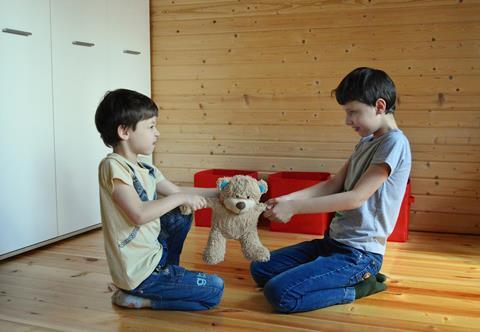As parents, the temptation is to put on a smile and tell everyone everything is OK even when it isn’t. Andrea Zanin from Kids Matter encourages Christian parents that there is blessing in being open and honest

It’s a sunny Tuesday morning in London and everyone in my family is getting ready for their respective days – a dad, a mum, and five kids. What could possibly go wrong? As it turns out… socks. Socks can go very wrong.
As I make my way down the hallway, humming as I head to the kitchen to do some quick dishwashing, I am accosted (quite literally) by two angry little girls who have no school socks. Why do they have no socks? Well, according to them, their big sisters have stolen them.
Now, using other people’s things without asking is a massive trigger in my house – as you might imagine in a family of seven – so, immediately, the switch flicks and I go into fight mode. Marching into the teenage girls’ shared room, I demand the stolen socks.
Of course, they deny everything. Then my 13-year-old chooses this exact moment to turn on her 15-year-old sister and accuse her of stealing her socks. The accused – arch culprit of acquired goods in our house – immediately goes on the defensive (with adequate amounts of special teen vitriol) and insists she was given permission by her accuser. And just like that, the Great Sock War of 2025 erupts — with accusations, shouting, eye rolls, and a stern (yet ignored) lecture about respect. Oh, and a side rant about phones in bedrooms — thank you (not thank you), The Anxious Generation, for that intrusive inner voice.
Words fly like bullets. Eventually, I pull everything out of the little girls’ drawers in frustration — only to discover at least ten white socks. Yes, really. Ten.
Meanwhile, my son quietly puts on his black socks and walks away. Lucky him.
When parents feel safe to be authentic, they not only grow as individuals but also grow in competence and gain confidence in their parenting
Walking to school, I try to listen to my 8-year-old’s morning chatter, but my mind is stuck in the sock aftermath. Did I handle that well? Have I scarred them? Am I raising five tiny delinquents destined to lie, cheat, and steal? I mean, it’s just socks… right? But of course, it’s never just socks. It’s morality. It’s life. It’s parenting.
It’s the wild rollercoaster of loving your children with every fibre of your being while simultaneously wanting to bury your head in a pillow and scream into the void. And if you’ve talked to other parents, you’ll know this emotional back-and-forth isn’t just yours – it’s universal. That constant fear that you’re doing your best and still somehow failing your kids. And in this knowledge is solace — and not just that, but also the impetus to keep trying.
Now, imagine riding that rollercoaster with no one to share it with (the highs and the lows) — either because you’re quite literally isolated (by circumstances or even choice), or held back by cultural expectations. How much lonelier — and therefore harder — is parenting then?
For many, Christianity can unintentionally make this worse. The call to be a godly example, to hold it all together, and to present a polished version of family life can feel overwhelming. It’s not that Scripture demands perfection — far from it — but sometimes church culture makes us feel like we can’t admit when things are messy.
Yet the Bible is full of stories about imperfect parents and messy families. Adam and Eve’s family life spiralled into tragedy when one of their sons killed the other. Isaac and Rebekah played favourites with their boys, which led to lies and family fallout. Then Jacob did the same with Joseph, sparking jealousy that ended with Joseph being sold into slavery by his own brothers. Even King David — described as a man after God’s own heart — missed the mark with his children, ignoring serious problems that led to pain and rebellion. Eli, a respected priest, turned a blind eye to his sons’ corruption. And even Mary and Joseph — handpicked by God — once lost track of 12-year-old Jesus for three days!
Read more:
Reframing our failures: Good enough parenting is good enough
Parenting your teenage children
These stories aren’t in the Bible to make us feel worse about our own parenting but to remind us that families have always been complicated.
God doesn’t expect us to be perfect; he meets us in our mess, works through our weakness, and offers grace right where we are. Parenting isn’t about getting it right all the time – it’s about showing up, depending on God, and trusting that he’s working even when things feel like a disaster.
What if we extended that same grace to one another? What if our chaos — our not-so-picture-perfect moments — were actually a gift, an invitation to others to be real, too?
By being honest about our challenges, we give others the freedom to do the same — and that’s when real connection happens: the kind that’s healing, transformative, and long-lasting. I see this every day through my work with Kids Matter, where vulnerability opens the door to stronger, more supportive communities.
Kids Matter’s vision is to ensure every child in need is raised in a strong family. We come alongside families through locally run parenting programmes, providing safe spaces for mums, dads, and carers to gather in small groups and work through evidence-informed material together. Our trained facilitators collaborate with community partners to ensure these groups are accessible and rooted in honest, judgement-free connection.
When parents feel safe to be authentic, they not only grow as individuals but also grow in competence and gain confidence in their parenting.
Vulnerability is not easy — but if we’re open to the idea that every parent, no matter their background or the chaos that comes with raising kids, has something valuable to offer (including ourselves!), it becomes a little easier.
In a Kids Matter group, we call it “the wisdom in the room” – learning from one another, laughing at the messiness of life, and reminding each other that we’re not alone.
Because socks may start a battle - but it’s community that will help us win the war.

































